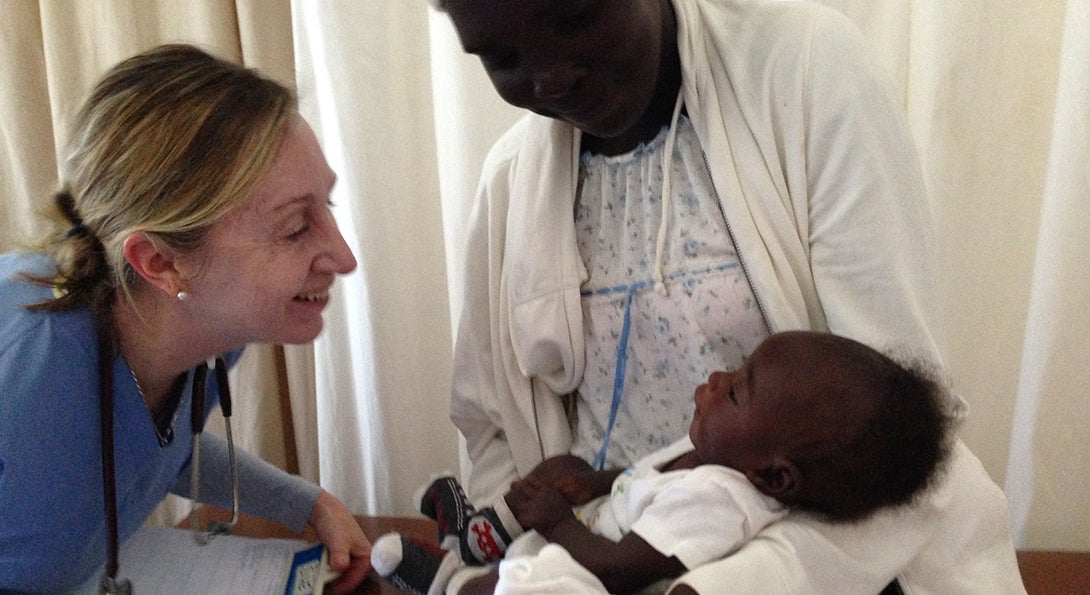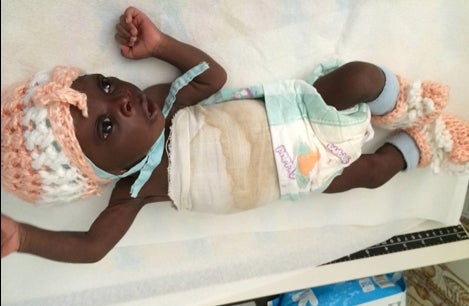Prof’s efforts improve umbilical cord care in Haiti

Research conducted by Susan Walsh brings life-saving treatment to Haitian newborns

From the time she began leading medical teams to a clinic in Haiti in 2006, UIC Nursing clinical associate professor and pediatric nurse practitioner Susan Walsh, DNP ’14, MS ’00, BSN ’80, CPNP-PC, noticed a disturbing trend.
Newborns were developing infections – sometimes fatal – from traditional umbilical cord practices. These practices involve covering the cord stub with cloth bindings and substances, such as herbs, ash or even animal excrement. Handed down through generations as a method to protect the baby, these actions instead introduce germs and cause infection.
Walsh set about studying the issue in partnership with Global Health Action , a nonprofit organization that has worked in Haiti since 1982. Together, they conducted a community campaign among pregnant women and lobbied the Haitian Ministry of Health for approval to bring potentially life-saving medicine into Haiti.
This years-long effort paid off in late 2021 when the Haitian government officially added 7.1% chlorhexidine digluconate – a topical antiseptic that has been shown to reduce local infection to the cord stump – to the list of approved National List of Essential Medications on its website . Only medicine on that list can legally be brought into the country.
“It was really amazing that after all these years, it finally got accepted,” Walsh says. “Now [chlorhexidine] can be brought in and aid organizations can begin to save babies by implementing an information campaign and distribution process.”
body
‘Sadly, infants die from that’
In 2006, Walsh and her husband, Brian, began leading medical teams to Mountain Top Ministries in rural Gramothe, Haiti. As the trips grew in popularity, Walsh formed the nonprofit group, Little by Little. (She was there during and after the devastating 2010 earthquake and documented her experiences in a book, “Walking in Broken Shoes: A Nurse’s Account of Haiti and the Earthquake.”)
Haiti is the poorest country in the western hemisphere, where the neonatal mortality rate is 25 per 1,000 live births, more than eight times the rate in the U.S.
Over the years, Walsh noticed infants coming to the clinic with bindings around their abdomens. The bindings were frequently stained and umbilical cord areas were sometimes infected and needed to be treated with antibiotics.
Participants in the focus groups explained that keeping a newborn’s cord covered by a cloth or other substance protects against evil spirits carried in the air, according to a paper Walsh published in the journal Global Public Health .
“The problem is that the umbilical cord needs to be open to air to avoid infection,” she says. “If it’s in a warm, dark environment covered by a binder and other clothing, and particularly if there’s a poultice that has the potential to be germ-infested, then sadly, infants die from that.”
Walsh joined the Chlorhexidine Working Group, an international collaboration designed to promote the use of the antiseptic to improve umbilical cord care. With the help of Global Health Action, which trains and supports traditional birth attendants, she conducted a community campaign to encourage pregnant women to use chlorhexidine. The study found that, among 198 new mothers, 98% used chlorhexidine at least once following the campaign (Walsh received special approval to use the antiseptic in her study).
Walsh and Global Health Action presented those results to the Ministry of Health in the hopes that the government would include chlorhexidine on its essential medicines list, allowing it to be brought into the country and distributed. After several years without any movement by the government of Haiti, Walsh’s organization, Little by Little, provided grant funding to Global Health Action in 2017 to increase their chlorhexidine advocacy efforts, increase in-country support, and formally request that the medication be added to the national essential medicines list. Those efforts paid off in late 2021, when it was added to the ministry’s website.
Wendy Jolley-Kabi, president and CEO of Global Health Action, says Walsh’s vision and work was what first got her organization involved.
“Sue’s dedication to maternal and neonatal health in Haiti has inspired us all and led to this incredible milestone,” she says. “During the years we have worked on this initiative, Haiti has faced natural disasters, political unrest, and economic challenges, but Sue never lost sight of the goal: saving the lives of babies.”
Walsh and Jolley-Kabi say there is more work to be done to make the antiseptic accepted and accessible on the ground in Haiti.
“The addition of the chlorhexidine to the national list does not automatically ensure access to this life-saving medication,” says Jolley-Kabi. “The next step is to promote acceptance of chlorhexidine into the National Operational Neonatal Plan and advocate for local manufacturing of the medication to ensure a stable supply chain.”
Walsh adds: “Cord care is still not where it needs to be. There will be a lot of work for accepting this versus traditional ways. However, we’ve seen a lot of changes in my clinic, and I think the word is getting out.”